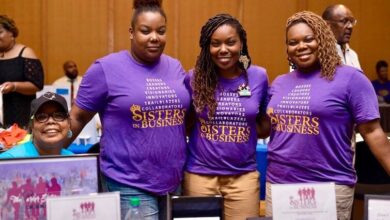Black-owned cannabis facility breaks ground in Inkster • Michigan Advance

Michigan Agricultural Services (MAS), an African-American firm, on Friday broke ground on a 25,500-square-foot high-tech indoor commercial cannabis processing facility in Inkster.
The $6 million project is scheduled to begin construction soon and is giving hope to some who have advocated for more opportunities for African Americans in Michigan’s marijuana industry after voters in 2018 legalized it for recreational use.
“Generational wealth and having access to the roadmap to economic mobility is key to the progression of the Black and Brown community,” said Sahir Al-Salam, community liaison and head of investor relations for MAS. “We have the opportunity to help create jobs and partnerships for our communities to thrive in this industry. Let’s work together and build something great.”
The effort founded by Detroit natives Al-Salam and Mark Stockdale, who are both Black, will be accessible to patients who seek cannabis products year-round at competitive pricing.
“We believe that in order for the cannabis industry to survive it has to be diversified,” said Stockdale, principal founder and chief executive officer for MAS. “It’s time for everybody to grow economically, and cannabis is a pathway for us to build wealth and invest in our communities.”
Michigan had $511 million of sales in recreational and $474 million in medical sales, generating over $100 million in tax revenue in its first year of recreational sales, according to the Associated Press. But the state also found that the commercial marijuana industry drastically failed to attract minority business owners.
Meanwhile, the state’s Marijuana Regulatory Agency collected data in December that showed 79% of people interested in ownership of licensed marijuana facilities were white. Black people accounted for 3.8% and 1.5% were Latino. Blacks compose about 14% of Michigan’s population and Latinos account for about 5% of the state’s population.
MAS received its initial application approval by the city of Inkster on Feb. 2, 2018 for processing and for grow license. The firm will operate as both a medical and recreational facility. The City Council approved the project in December.
The effort comes as Michigan communities are dealing with the aftermath of the 2018 ballot initiative. Several cities have adopted local policies for the establishment of cannabis businesses to operate, while some have banned them.
There have been some growing pains.
As the Advance previously reported, a federal judge in April halted the city of Detroit from processing recreational marijuana business applications. U.S. District Judge Bernard Friedman issued a temporary restraining order in a lawsuit that challenges a local ordinance that gives licensing preference to longtime city residents.
In the Wayne County Circuit Court filing dated March 2, Crystal Lowe, who has lived in Detroit for 11 of the past 30 years, said she plans to apply for an adult-use retail establishment license. However, the River Rouge resident believes that the Detroit ordinance is unfair.
Kevin Blair, Lowe’s attorney, in the filing described the city’s application process as a “scheme” that violates the equal protection and due process clauses of the Michigan Constitution and the commerce clause of the U.S. Constitution.
The ordinance states applicants are given priority if they have lived in the city for 15 of the last 30 years; lived in Detroit for 13 of the last 30 years and are low-income; or lived in Detroit for 10 of the last 30 years and have a past marijuana-related criminal conviction. At least 50% of the licenses must be issued to legacy residents. The city also offers residents reduced application fees and up to a 75% discount on city-owned land. Detroit is 79% Black and 7.6% Latinx.
Christina McPhail-Stockdale, legal counsel to MAC, has countered and filed a brief in federal court supporting Detroit’s ordinance.
“Overall, the legacy statute ensures that the social equity mandates of inclusion are met by encouraging residents to apply for licensing,” the brief reads, in part.
GET THE MORNING HEADLINES DELIVERED TO YOUR INBOX























































